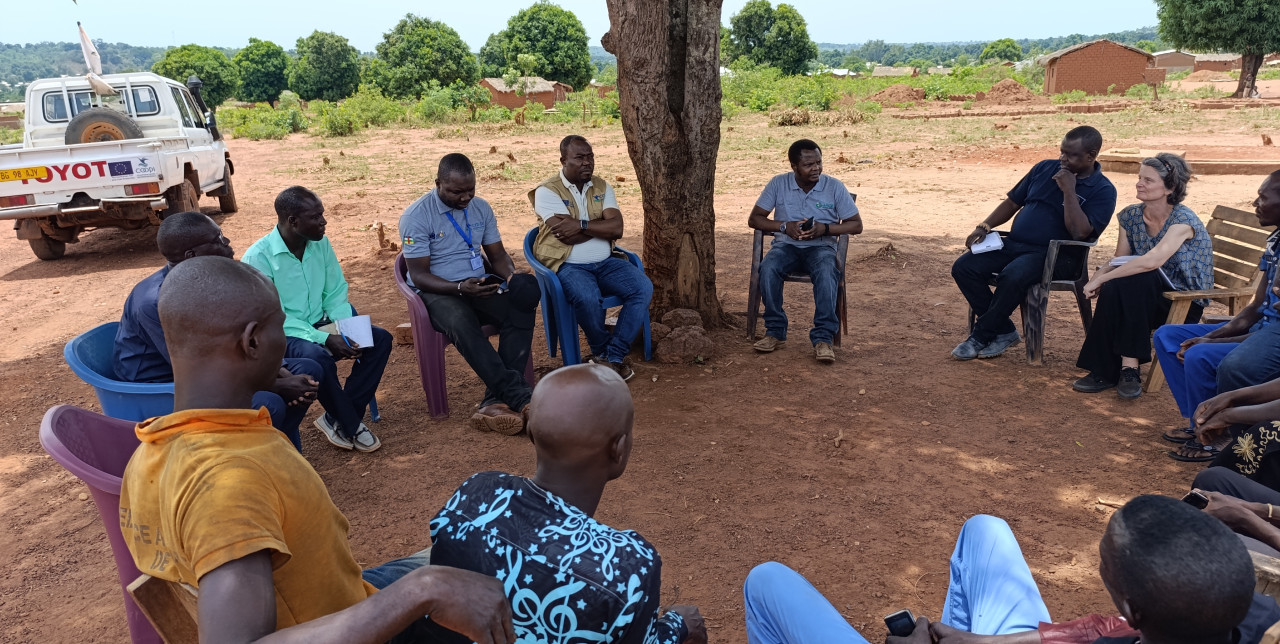28-03-2025 | di COOPI
CAR: Bozoum, Emergency Response ensures schooling for displaced children
Ouham-Pendé prefecture, one of the fourteen in the Central African Republic (CAR), is the scene of a dramatic escalation of violence, fueled by armed conflict that continues to generate serious violations of the rights of the civilian population.
COOPI – Cooperazione Internazionale, with funding from European Humanitarian Aid (DG ECHO), is responding through the project “Integrated emergency response to support accessible, inclusive, quality and protective education for the most vulnerable populations affected by the crisis in the Central African Republic.”
This aid targets displaced children and youth who are not attending school, have dropped out, or no longer have access to education in the areas of Obo, Zémio, Mboki, and Bozoum, by providing a rapid, targeted educational response appropriate to the emergency context.
Violence in Bozoum: An Increasingly Unstable Context
Since late February 2025, Ouham-Pendé prefecture has been experiencing a new and unprecedented wave of violence. Starting on February 27, serious conflict incidents were reported along the Bozoum–Bouar and Bozoum–Bocaranga axes, involving armed transhumant groups, 3R militias, and local self-defense forces. This sequence of events has drastically worsened the security situation in the area, forcing hundreds of families to flee toward Bozoum town and its surroundings. In March 2025, Bozoum continued to receive a large influx of displaced persons, who have been welcomed into various reception sites and by host families.
Field Assessment of the Education Situation
On March 19, 2025, COOPI and APADE teams conducted a rapid assessment in the displacement sites in Bozoum to analyze the educational needs of children affected by the conflict. The survey revealed a number of serious and widespread issues preventing access to education for hundreds of children. First, it was found that about 950 displaced students are currently not attending school, resulting in a prolonged suspension of their right to education. The assessment also identified 30 displaced teachers, now settled in Bozoum town, who represent a potential resource for supporting educational continuity, but who currently lack the necessary tools to carry out their work. One of the most critical issues identified is the complete absence of school and teaching materials: no children have backpacks, notebooks, or writing supplies, and no teachers have access to educational materials to ensure effective teaching.
Additionally, existing schools in Bozoum are struggling to accommodate the influx of displaced students, leading to overcrowding and putting pressure on an already fragile education system. Host school facilities lack adequate sanitation services and are in poor and alarming sanitary conditions, according to field teams. These conditions compromise not only the quality of learning but also the safety and well-being of both students and education personnel.
Rapid Education Response
During displacement, access to education for children is a top priority, given their extreme vulnerability. In collaboration with the Academic Inspectorate of Ouham-Pendé, COOPI promptly activated an emergency response mechanism to ensure educational continuity in reception areas. With the support of local school principals and a general reorganization of resources, it was possible to integrate displaced students into afternoon classes, led by displaced teachers, to compensate for the lack of space in host schools.
At the same time, a comprehensive intervention plan was developed to support all displaced school-aged children. However, many minors still remain excluded from the education system due to various causes, having lost months or even years of schooling. To reach this particularly vulnerable group, COOPI teams conducted targeted profiling to develop educational support tailored to their specific needs. These actions are part of a rapid and targeted emergency response, urgently deployed to prevent the educational exclusion of hundreds of children. Yet, much remains to be done. COOPI will continue working in the area to strengthen access to safe, inclusive, and sustainable education for all children affected by the crisis over the medium to long term.
COOPI – Cooperazione Internazionale has maintained a constant presence in the Central African Republic since 1974, implementing emergency and development projects mainly in the sectors of protection, education in emergencies, and food security. Since May 2024, the project “Integrated emergency response to support accessible, inclusive, quality and protective education” aims to prevent and reduce the interruption of formal education for school-aged children, promoting an integrated approach to improve the health conditions of children and their communities.




 Central African Republic
Central African Republic